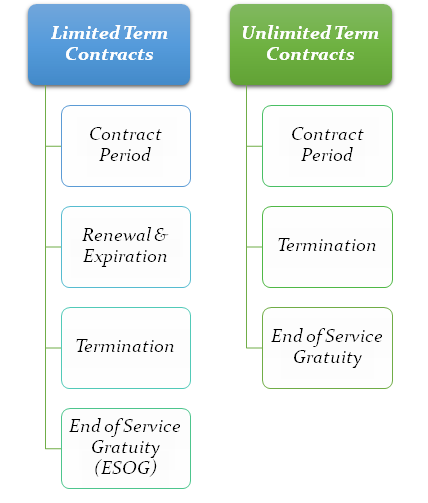The United Arab Emirates (UAE) has a reputation for having employee-friendly labour rules. In the United Arab Emirates, the relationship between an employer and an employee is regulated by Federal Law No. 8 of 1980 on Labour Relations (UAE Labour Law).The UAE Ministry of Human Resources and Emiratisation (formerly the Ministry of Labour and Social Affairs) has formed a labour department in each of the UAE's emirates to facilitate dispute resolution and other labour-related issues (Labour Department). Employees in the public sector, domestic workers in families, and employees in some free zones in the UAE with their own employment laws (for example, the Dubai International Financial Centre (DIFC) and Abu Dhabi Global Markets (ADGM)) are exempt from the UAE Labour Law.
Types of Employment Agreement in UAE
The UAE Labour Law has been updated on a regular basis to meet the changing needs of the labour market. Employers and workers in the UAE may enter into two forms of employment contracts:
- Limited Term Contracts and
- Unlimited Term Contracts, according to the UAE Labour Law.
This article examines some of the distinguishing characteristics of these two forms of work contracts.

Limited Term Contracts
A limited term contract is a fixed-term contract that is usually related to the length of time that the UAE resident visa is valid (i.e. two or three years, depending on the location of the employer). Unless one party terminates it sooner or both parties renew it, it will automatically expire at the end of the term.
Contract Period
A fixed term contract will last no more than two (2) years.
Renewal and Expiration
A limited-term contract is deemed to be automatically extended from the date of expiry for an additional term equal to the original term of the contract unless the employer or the employee has given the other party written notice (at least one (1) month prior to the date of expiry) of its intention not to renew the contract.
Termination
A limited-term contract may be terminated in one of the following ways before it expires:
- Termination by the employer for his or her own convenience
An employer may end a limited-term contract by awarding an early termination bonus to the employee. In this case, the early termination bonus should be equal to the lower of the employee's remuneration (including standard wages and allowances) for the following periods:
- three (3) months; or
- the remainder of the contract term.
A limited-term contract may also be terminated by an employer for a legitimate reason (for example, an employee's failure to perform after repeated warnings) by providing adequate notice.(a minimum of one (1) month and a maximum of three (3) months) to the employee in compliance with the employment contract's terms.
- Employee termination for convenience
An employee may terminate a limited-term contract by paying an early termination fee to the employer. In this case, the early termination bonus should be equal to half of the employee's monthly remuneration (including standard wages and allowances) for either:
- three (3) months; or
- the remainder of the contract's duration.
- Employer termination for gross misconduct
If the conditions set out in Article 120 of the UAE Labour Law apply, an employer may terminate a limited term contract without providing any notice or paying any termination fee (including end of service gratuity). Article 120 of the UAE Labour Law specifies the following situations:
- if the employee commits a mistake that causes the employer substantial material loss;
- if the employee disobeys safety instructions at work;
- if the employee reveals confidential information of the employer; or
- if the employee is convicted of a crime against honour, honesty, or public opinion.
- Employee termination for gross misconduct
If any of the conditions mentioned in Article 121 of the UAE Labour Law apply, an employee may terminate a fixed term contract without providing notice or paying any termination compensation. The employee is attacked by the employer or the employer's legal representative in the situations set out in article 121:
- the employer has not fulfilled its obligations to the employee (for example, failure to pay salaries); and
- (the employer or the employer's legal representative has not fulfilled its obligations to the employee (for example, failure to pay salaries).
End of Service Gratuity (EOSG)
The amount of an end-of-service gratuity paid to an employee following the termination of a limited-term contract depends on a variety of factors, including-
- whether the contract was terminated by the employer or the employee; and
- the number of years of service.
The following are the minimum end-of-service gratuities that are payable under various circumstances:
- EOSG where contract is terminated by Employer
When an employer terminates a limited term contract, the EOSG is only due if the employee has completed one (1) year or more of continuous service and is determined on the basis of 21 calendar days' basic pay for each year of the first five (5) years of service and 30 calendar days' basic pay for each year after that (after year five). If the contract has been terminated for gross misconduct by the employee, however, no EOSG is payable.
- EOSG where contract is terminated by Employee
When an employee terminates a limited-term contract before completing five (5) years of continuous service, the employer is not obligated to pay any EOSG. If the employee has completed more than five (5) years of continuous service, EOSG is payable on the same basis as described in paragraph above (a). If the contract is terminated under article 121, the employee is entitled to their full EOSG if they have worked for one (1) year.
Unlimited Term Contracts
An unlimited term contract is a type of contract that is open-ended, more flexible, and widely used in the UAE. It can be ended by mutual consent or by offering a 1 to 3 month notice period. During the notice period, both parties must fulfil their responsibilities.
Contract Period
An unlimited-term employment contract, as the name implies, is not for a set period of time and requires a continuing employment obligation between the employer and the employee until either party terminates it. If a contract of employment does not specify a period or expiration date, it is deemed to be an unlimited-term contract, regardless of the parties' intentions at the time of signing.
Termination
An unlimited term contract can be terminated in the following ways:
- Termination by Employer
An employer may terminate an unlimited term contract for a reasonable reason (for example, the employee's failure to perform after repeated warnings) by giving the employee sufficient notice (minimum one (1) month and maximum three (3) months) in compliance with the employment contract's terms. The employer is only expected to pay the employee his end-of-service gratuity in this situation. If an employer terminates an indefinite term contract without cause, the employer will be liable to pay the employee compensation equal to three (3) months remuneration for convenience in addition to the end of service gratuity.
- Termination by Employee
An employee has the right to terminate an indefinite term contract for convenience by providing the employer with sufficient notice (minimum one (1) month and maximum three (3) months) in compliance with the employment contract's terms. And if the employee terminates the employment contract, the employer is still obligated to pay the employee the end-of-service gratuity.
- Termination by Employer for Gross Misconduct
If the conditions set out in Article 120 of the UAE Labour Law apply, an employer may terminate an unlimited-term contract without providing any notice or paying any termination fee (including end-of-service gratuity). Article 120 of the UAE Labour Law specifies the following situations:
- if the employee commits a mistake that causes the employer substantial material loss;
- if the employee disobeys safety instructions at work;
- if the employee reveals confidential information of the employer; or
- if the employee is convicted of a crime against honour, honesty, or public opinion.
- Termination by Employee for Gross Misconduct
If any of the conditions mentioned in Article 121 of the UAE Labour Law apply, an employee may terminate a fixed term contract without providing notice or paying any termination compensation. The employee is attacked by the employer or the employer's legal representative in the situations set out in article 121:
- the employer has not fulfilled its obligations to the employee (for example, failure to pay salaries); and
- the employer or the employer's legal representative has not fulfilled its obligations to the employee (for example, failure to pay salaries).
End of Service Gratuity (EOSG)
The amount of an end of service gratuity paid to an employee upon termination of an indefinite term contract depends on a variety of factors, including
- whether the contract was terminated by the employer or the employee, and
- the number of years of service.
The following are the minimum end-of-service gratuities that are payable under various circumstances:
- EOSG where contract is terminated by employer
When an unlimited term contract is terminated by the employer, the EOSG is only payable if the employee has completed one (1) year or more of continuous service, and is determined on the basis of 21 calendar days' basic pay for the first five (5) years of service and 30 calendar days' basic pay for each additional year (after year five). If the contract has been terminated for gross misconduct by the employee under Article 120, however, no EOSG is due.
- EOSG where contract is terminated by employee
When an employee terminates an unlimited term contract after completing at least one (1) year of continuous service, the EOSG is measured first on the same basis as in paragraph (a) above, and the EOSG payable is then defined as follows:
- If the employee has not worked for more than three (3) years, the EOSG payable is equivalent to 1/3 of the total EOSG amount;
- If the employee has worked for more than three (3) years but not five (5) years, the EOSG payable is equivalent to two-thirds of the overall EOSG; or
- If the employee has worked continuously for more than five (5) years, the whole sum must be paid without deduction.
DhanGuard: All-in-One Solution for Business Setup in Dubai, UAE
DhanGuard is your ultimate one-stop solution for all your business needs. Whether you’re planning to set up a new company or expand your existing business in the UAE, we’ve got you covered with our comprehensive range of services. From Company Formation in UAE and Business Bank Account in UAE services to managing your financial and legal compliance, we provide everything you need under one roof.
Our services include:
- Company Formation in UAE and Dubai
- Opening a Business Bank Account in UAE and Dubai with a 99% success rate
- VAT & Corporate Tax Compliance
- Accounting, Bookkeeping, and Auditing Services
- Trade License Renewal
- Golden Visa Assistance
Let DhanGuard make your journey of Business Setup in Dubai seamless and hassle-free!










